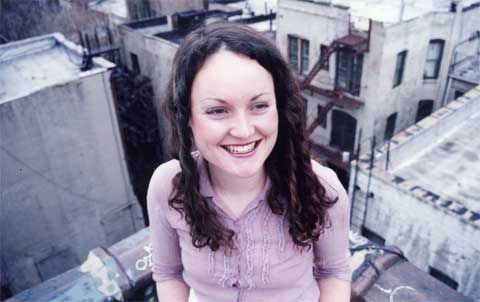
SOUL CELLS On Anne Heaton's fourth solo record, Honeycomb, the former Bostonian offers her most eccentric work. |
Singer and keyboardist Anne Heaton never wanted to be a solo artist, but it's been that way since her first album in 2002. "The vision that I have is that I'd always be playing with a string quartet, a full band, and a small gospel choir," half-jokes the former Boston artist, who recently moved to Chicago to start a family. Traveling alone is an economic reality for a touring musician. No bandmates fill her car, but different musical friends are there to join her on-stage in different cities.
Also, solitude might just be the best situation for an artist who likes to do what she wants. No bass player in the mixing room with a greedy hand on the volume knob. No collaborator trying to get you to be more Björk-ish. But this free-wheeling freedom that comes with no big-label pressure can make a bohemian songwriter go perfectly nuts. Honeycomb, Heaton's forthcoming release (and her fourth overall), is her most eccentric work yet. Produced by Hem's Gary Maurer and Q Division's Mike Denneen, the album features Heaton's own open-hearted originals mixed with a wide range of outside elements, including collaborations with NYC-songwriter Neil Cleary, musical adaptations of two poems by 13th-century Sufi mystic Rumi, an adaptation of the Catholic "Saint Francis Prayer," a field-recording of a conversation with her father, and let's not forget that tactfully minimalist cover of Coldplay's "Viva La Vida."
When asked how she knows when songs are right for her, Heaton says simply, "If I love them." It's a subjective criterion if there ever was one, but for an artist who operates on instincts, heeding one's whimsy isn't such a bad thing. "In the past I wasn't letting other people into the creative process," explains Heaton, regarding the direction of her new album. And in her mind, letting in influential figures from the past and present adds newfound richness. This doesn't just include Cleary, Chris Martin, and Heaton's father (who provides a link to her grandfather, the protagonist for the tear-jerker "Last Drive"), but also voices long-gone, such as Rumi and Saint Francis, who Heaton brings to sit with her on the bench of her gently worn Fender Rhodes.
Heaton's husky voice is a steadying force as we skitter with her across the flotsam and jetsam of her life. Where "Last Drive" offers a sketch of an old man returning to the town of his youth, "Sin Verguenza" reveals a woman's involvement with a Spanish soap; and with a lyric like "You haven't chosen between your live-in beau and your ex-husband/But you always look good for both of them," it's hard to know which song is more true to life. Mixing a little profane in with the sacred might just be a thing here. At first, the Coldplay selection comes across as a callow dime in the jukebox, but its use of archaic fixtures (kings, castles, etc.) sets the stage for Heaton's journey into the eternal.